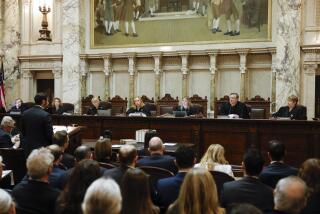Wisconsin recall election a test of voter sentiment
- Share via
Reporting from Milwaukee and Washington — The setback that Democrats and their labor allies suffered in the battle to reclaim Wisconsin underscores the challenge they and President Obama face as both parties prepare for the 2012 election.
Tuesday’s election — an attempt to recall six Republican state senators — was the first test of voter sentiment since the summer’s debate over the national debt and the renewed stalling of the economy. Strategists on both sides were watching the contests as an early showdown on the economic themes likely to propel next year’s campaigns.
After elections in 2006 and 2008 that went heavily to Democrats and a 2010 contest dominated by Republicans, the results provided a snapshot of an electorate in between — highly polarized, closely divided, with hardened political positions. The voting presages a 2012 election season likely to be one of the most hard-fought in a decade.
The recalls drew more than $30 million in campaign spending, an enormous amount for off-year state legislative races, and generated robust turnout on both sides.
The outcome was close and in doubt up until the end. Even Republican state Sen. Alberta Darling, whose victory in the Milwaukee suburbs guaranteed that the Republicans would keep control of the state Senate, acknowledged that she wasn’t sure she would survive. She was one of four GOP senators who held onto their office, leaving the party with a one-seat margin in the chamber.
Democrats could point to voting in several districts that showed resistance emerging to the GOP’s “tea party”-styled platform.
Still, they fell short in a recall battle they had chosen in a state that has long been a national indicator. It is a state Obama almost certainly needs to carry if he is to win reelection.
While strategists in both parties resisted reading too deeply into the national political mood based on Tuesday’s results, the outlook for Democrats does not shout, “Yes, we can.”
“If we’re headed for a squeaker in Wisconsin, it means we’re headed for a squeaker nationally — and that’s got to make the White House nervous,” said Stu Rothenberg, editor of the influential Rothenberg Political Report in Washington.
“It’s about as tough for Democrats in 2012 as it was in 2000.”
Democrats and their union allies now have their sights on Ohio, where the November ballot will include a pair of referendums that encapsulate the broader debate: One measure, pushed by labor, would repeal an anti-union law passed this year by the state Legislature; the other, sponsored by conservatives, would overturn key features of Obama’s healthcare law.
Wisconsin, despite Obama’s overwhelming victory in 2008, has long been a swing state. Democrats only narrowly won two of the last three presidential contests.
The recalls were launched after Gov. Scott Walker and his GOP allies sharply curbed collective bargaining rights for public employees and made them pay more for benefits as part of state budget-cutting efforts this spring. Protests by thousands of union workers at the statehouse spurred a recall effort aimed at reversing Republican control of the state Senate.
Democrats, amid the economic slump and high joblessness, looked to the recall for vindication.
In the aftermath, a much-touted effort to recall Walker, who under state law cannot be recalled until he has spent a year in office, is uncertain. With the 2012 election season looming, Democratic fundraisers may decide their cash could be used for better purposes.
“It’s clearly a big loss for labor, given the time and money devoted to it,” said Doug Heye, a GOP strategist in Washington.
At the same time, the backlash to Walker’s policies mobilized union activists, many of whom have been unenthusiastic about Obama’s presidency. Democrats said the Wisconsin episode provided a crucial organizing tool that will pay dividends.
“This shows that Democrats can battle on the Republican turf and will be energized in time for the 2012 presidential election,” said Democratic strategist Donna Brazile.
Democratic strategists also noted that the state’s recall rules meant they could not go after potentially vulnerable Republicans first elected in 2010. Had the race been statewide, they would have achieved their goal, said Paul Maslin, a Democratic pollster and strategist with extensive experience in Wisconsin.
“It’s no great victory for the Republicans,” Maslin said. “It’s a 50-50 state. It’s a 50-50 country. Voters are upset at everybody.”
More to Read
Sign up for Essential California
The most important California stories and recommendations in your inbox every morning.
You may occasionally receive promotional content from the Los Angeles Times.














